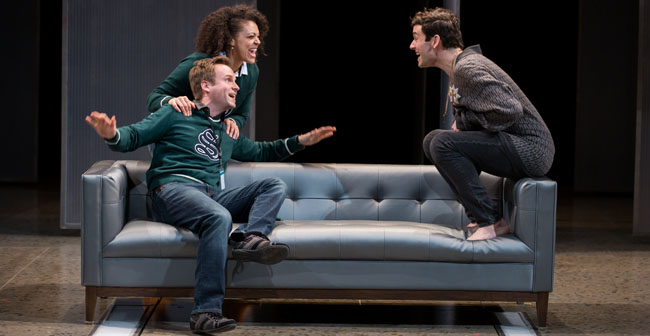Culture
 Photo: Scott Suchman
Photo: Scott Suchman
Rosencrantz and Guildenstern Give Depth to STC’s Hamlet
February 9, 2018 @ 12:00am
Rosencrantz and Guildenstern may have famously failed to play upon Hamlet as a pipe, but at Shakespeare Theatre Company, they firmly fingered all my stops. The production is STC’s latest take on Hamlet, at Sidney Harman Hall through March 4, and it is one which I cannot recommend enough.
At the theater, I speak with Ryan Spahn and Kelsey Rainwater, who play Rosencrantz and Guildenstern respectively. The two delve into their characters (down to their course of study at Wittenberg), regale me with stories of the side jobs actors work and explore that je ne sais quois that makes this Hamlet great. The readily apparent distinction of their Rosencrantz and Guildenstern is that Guildenstern is a woman, but the more salient distinction is the complexity of their take; though it is cool that Guildenstern is a woman, because why not?
“We had to figure out what we were going to do,” Spahn tells me, “because the trap of this duo is that they can be clowny, and only that.”
To give greater depth to their characters, they took their time in mining the duo’s relationship with Hamlet.
“At first I thought we were just good friends who had fallen out of touch,” Spahn continues. “But then as it developed, I [came to] feel like we were really good friends. But we were also jealous of him because he had it so easy because he comes from such wealth.”
“And we did not,” Rainwater adds for emphasis.
Spahn and Rainwater have a way of picking up where the other leaves off. Spahn continues.
“So we had 10 or 12 years of friendship with him where that [tension] grated on us.”
Rainwater adds, “We understood each other in a way which Hamlet never understood us. It did start out like we’re all chums, we’re all on equal footing. But then once outside of school, we realized that that’s not it at all, that we don’t belong in his world.”
Spahn says that’s also the tricky part with this plot point.
“We’re all just friends, so why turn on [Hamlet]? For us, we realized we’re almost angry at him because he had it so easy. Even if no one in the audience can tell, it grounds us and our path in something that we very much need to do.”
Rainwater agrees.
“This is our chance for success – finally.”
Spahn tells me that they draw on personal experience for the part.
“I think we can just relate to this as actors and artists. When you have close friends or loved who skyrocket to success, or even something so simple as you wanted a job and someone else got it…you deal with jealousy so easily in this field, that anytime I can use it onstage helps me in my real life to not feel it. You can get it out. I think we talked about that.”
He turns to Rainwater and she nods. I follow up by asking them what they studied at Wittenberg with Hamlet. Rainwater laughs and goes first.
“I like to think I studied philosophy. Like Hamlet’s really good at this, at philosophizing, so maybe I should try, and then I took the class and realized I was way over my head.”
Spahn responds deadpan.
“I assumed we did something like poli sci, [something] that was really general so that when we graduated, people were like, ‘What do we do with you? You have no skills.’”
It turns out that this is not far from the truth in Spahn’s case. In New York, he applied to a temp agency and was told he had no skills. Still, the interviewer invited him in for an hour to see if he could figure out how to work an office phone. He went in and could not.
“I went home and I was like, ‘Well that didn’t work.’ I eventually went back to school, but I never went back to a temp agency.”
Spahn and Rainwater speak openly, and it’s this clarity that marks their acting. Michael Urie plays Hamlet in a similar vein. Spahn and Rainwater describe this as the contemporary style that’s popular right now.
“You’re trying to be in the moment,” Rainwater says, “to listen and to respond to what’s given to you.”
“There’s less showmanship,” Spahn adds.
This contrasts with the acting of Keith Baxter, who plays the Grave Digger, the Player King and the Ghost. Baxter once acted alongside Orson Welles in Chimes at Midnight, and his style is more performative and gestural (re: classical).
Spahn says having such different and cross-generational styles of acting is something director Michael Kahn was intent upon. And it works. According to Spahn, it works because of the cohesiveness of the company. He cites that cohesiveness as the source of the play’s success, too.
“One of the most successful things we did – particularly because there are so many different acting styles – is getting a cast of 20-25 people in the same play that you believe actually know each other; that they’re performing in the same style of production. Often you’ll see things and it feels like suddenly we’re in a different play, and this one doesn’t feel that way, and that’s a hard thing to do. I think it speaks to how well this company gets along.”
“We party all the time,” Rainwater says, though the bro voice she adopts and the way she laughs says otherwise. Spahn picks up what she’s saying though.
“We’re sort of all really into each other. Even Keith Baxter knocked on our door last night at 12:15 in the morning and was like, ‘I was having dinner with somebody and they liked the play. G’night!’” he says, putting on a sabled English accent.
The play is one which I’m sure my editor would prefer I’d quit gushing about at this point, but there is so much about it which recommends itself. The use of technology is subtle and fluent. The actors, and in particular Michael Urie, are funny. The whole is captivating and convincing. And Hamlet only runs through March 4, so you better get your tickets ASAP. For tickets and more information, visit www.shakespearetheatre.org.
Sidney Harman Hall: 610 F St. NW, DC; 202-547-3230; www.shakespearetheatre.org








